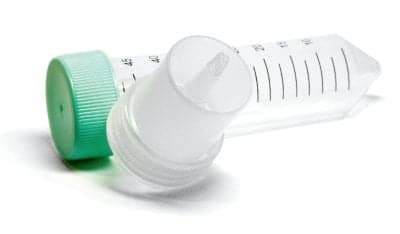Tumor Marker Control
Unbiased assessment of Testing
 |
Lyphochek Tumor Marker Control from Bio-Rad Laboratories, Irvine, Calif, is a comprehensive, bilevel product designed to monitor the performance of various cancer antigen test procedures, including several esoteric tumor markers. This human serum-based control acts similar to a patient sample to add confidence in test results. A 3-year shelf life at 2°C to 8ºC reduces the frequency of control lot crossovers and saves reagent costs. Controls from a third-party manufacturer, such as Bio-Rad Laboratories, provide an unbiased assessment of any testing system. They can help monitor assay performance and improve the quality of results. The Unity Interlaboratory Program is available through the life of the lot. Customers may also subscribe to one of the company’s Unity Quality Control Data Management Solutions designed to improve the effectiveness of statistical process control.
Bio-Rad Laboratories
(800) 224-6723; www.bio-rad.com/diagnostics.
Laboratory Information System
Can eliminate paper
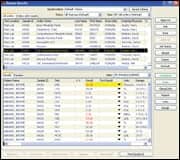 |
Since 1993, hundreds of clinical laboratories across the country have turned to Orchard Software Corp, Carmel, Ind, for their laboratory information system (LIS)-including all types and sizes of multisite and multispecialty clinics and physician’s office laboratories, hospitals, regional reference labs, student health service centers, and public health organizations. The award-winning Orchard Harvest LIS uses process automation; robust instrument, billing, EMR, and reference laboratory interfaces; and rules-based technology to address regulatory and integration issues and to simplify laboratory workflow. Harvest LIS improves reimbursements and simplifies medical-necessity validation by automatically screening ICD-9 codes, testing frequency, and experimental procedures during order entry. As a stand-alone laboratory system, Orchard specializes in seamless integration, which makes host system, EMR, billing, and reference laboratory interfaces routine, and linking multiple sites possible. Harvest LIS Microbiology and Anatomic Pathology modules eliminate paper and electronically integrate these departments with the rest of the laboratory.
Orchard Software Corp
(800) 856-1948; www.orchardsoft.com.
Monoclonal Antibody for Cytokeratin 7
Can differentiate between tissues
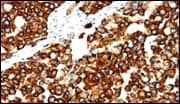 |
Anti-Cytokeratin 7 Antibody (Clone OV-TL12/30) from BioGenex, San Ramon, Calif, is designed for the specific localization of Cytokeratin 7 protein in formalin-fixed, paraffin-embedded tissue sections that are used in IHC applications. Cytokeratin 7 is a 54 kD marker of simple epithelium. It can be found in the columnar and glandular epithelium of the lung, cervix, and breast, as well as in bile ducts, collecting ducts in the kidney, and mesothelium. Antibody to cytokeratin 7 strongly stains all cell layers of the urinary bladder transitional epithelium. However, cytokeratin 7 is absent from gastrointestinal epithelium, hepatocytes, proximal and distal tubules of the kidney, and myoepithelium, and also cannot be detected in the stratified epithelia of the skin, tongue, esophagus, or cervix. Ramaekers et al demonstrated that the OV-TL 12/30 monoclonal antibody to cytokeratin 7 recognizes specific subtypes of adenocarcinomas and can be used to differentiate between cytokeratin 7-positive tissues such as ovarian carcinomas and transitional cell carcinomas and cytokeratin 7-negative tissues such as carcinomas of the gastrointestinal tract and prostate cancers. BioGenex offers anti-Cytokeratin 7 Antibody in concentrated form and as a ready-to-use reagent for manual use. The antibody has been optimized for use with the company’s Super Sensitive Ready-to-Use Detection Systems.
BioGenex
(800) 421-4149; www.biogenex.com.
Mesothelioma Test
Detects disease caused by asbestos contact
 |
The Mesomark test from Fujirebio Diagnostics, Malvern, Pa, is an enzyme-Linked immunosorbent assay for the quantitative measurement of soluble mesothelin-related peptides in human serum. This test has recently been approved by the FDA under the Humanitarian Device Exemption (HDE) program as an aid in the monitoring of patients diagnosed with epithelioid or biphasic mesothelioma. Mesothelioma-a rare form of cancer that affects the sac lining of the chest, the abdominal cavity, or the areas around the heart-has been linked to asbestos exposure. Many people with this cancer have been employed in environments where they inhaled asbestos, such as in the shipbuilding and construction industries. Most insulation and construction materials manufactured before the mid-1970s contained asbestos, including insulation on pipes and boilers; fireproofing spray; roof, floor, and ceiling tiles; and brakes and clutches. Others have been exposed to asbestos in households or the general environment. Currently, more than 100 million people worldwide have been exposed to asbestos through their professions over the years-often unknowingly-including shipyard workers, insulators, boilermakers, plumbers, and maintenance workers. Data indicates that the use of this test is probably beneficial; however, its effectiveness has not been demonstrated. Therefore, Mesomark values are to be interpreted in conjunction with all other available clinical and laboratory data. The test will become available in the United States exclusively through ARUP Laboratories in the first quarter of 2007. HDE approval requires physicians ordering Mesomark to be certified by Fujirebio’s central Institutional Review Board prior to ordering the test.
Fujirebio Diagnostics
(800) 342-9225; www.fdi.com.
Oncology Lab Information System
Can run as a paperless system
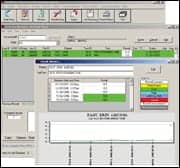 |
IMPAC Medical Systems Inc, Mountain View, Calif, an Elekta company, provides integrated solutions for the medical oncology practice, including IntelliLab, a full-featured laboratory information system that complements the growing oncology practice. IntelliLab offers full management reporting, a quality-control module, the ability to interface to 400+ laboratory instruments, and round-trip reference lab interfaces. With a graphical user interface, users can effectively maneuver through the menu options in a logical and easy workflow. With the insurance keyword table, labs are automatically directed to the appropriate performing location. Administrator-defined security functions limit laboratory work to approved laboratory personnel. The system includes a complete audit trail from start to finish of a patient order, and offers faxing of reports from within the application and the ability to become a completely paperless system. IntelliLab works in conjunction with the company’s image-enabled oncology electronic medical record, Mosaiq. Orders are placed in Mosaiq, and laboratory personnel retrieve orders in IntelliLab. Completed labs are easily viewed in the Mosaiq e-chart. The company’s open integration to multiple health care data and imaging systems offers oncology-specific patient charting and practice management, while providing a comprehensive oncology-management solution that helps improve overall communication, process efficiency, and the quality of patient care.
IMPAC Medical Systems Inc
(408) 362-2267; www.impac.com.
Monoclonal Antibody
Available concentrated or ready to use
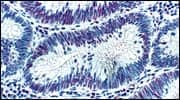 |
Anti-c-myc Antibody (Clone 9E10) from BioGenex, San Ramon, Calif, is designed for the specific localization of c-myc protein in formalin-fixed, paraffin-embedded tissue sections that are used in IHC applications. Activated proto-oncogenes play an important role in the development and progression of human cancers. One of these proto-oncogenes, c-myc, was initially identified through study of the cancer-inducing oncogene present in the MC29 avian retrovirus. The c-myc proto-oncogene is mapped on chromosome 8, and the activated expression of c-myc seems to accompany abnormalities in the progression of various malignancies such as lung, breast, and colon carcinomas as well as melanomas. The c-myc gene product has been shown, through molecular studies, to be an essential protein for replication of cellular DNA and for the enhancement of mRNA transcription. The human c-myc gene gives rise to 64-kD and 67-kD nuclear phosphoproteins that both exhibit short half-lives in vivo and further exhibit DNA-binding properties in vitro. Monoclonal antibody 9E10 reacts with the AEEQKLISEEDL epitope of c-myc protein. BioGenex offers anti-c-myc antibody in concentrated form and as a ready-to-use reagent for manual use. The antibody has been optimized for use with the company’s Super Sensitive Ready-to-Use Detection Systems.
BioGenex
(800) 421-4149; www.biogenex.com.
Breast Cancer Diagnosis
Research on way to decide treatment
 |
diaDexus Inc, South San Francisco, has announced a collaboration with Mayo Validation Support Services to investigate a test featuring a select panel of tumor-specific genes to aid in patient-risk stratification and assist in chemotherapy treatment decisions for breast cancer patients. The test uses gene-expression profiling to predict recurrence of malignancy in patients diagnosed with primary invasive early-stage breast cancer. Previous study data presented by diaDexus at the 2005 San Antonio Breast Cancer Symposium demonstrated that a set of eight genes were differentially expressed in patients who presented with progressive disease, compared with those who were disease-free after a median follow-up of 70 months, suggesting that the PCR-based test involving these genes warrants additional investigation into its utility in identifying patients at higher risk for recurrence. Polymerase chain reaction is a technique for amplifying DNA or RNA sequences in a laboratory in order to facilitate diagnostic testing or research. In this larger confirmatory study with Mayo Validation Support Services, diaDexus investigators will evaluate whether the test, which includes the previously identified eight genes in addition to others, can help provide breast cancer patients with personalized prognostic information.
diaDexus Inc
(650) 246-6400; www.diaDexus.com.


